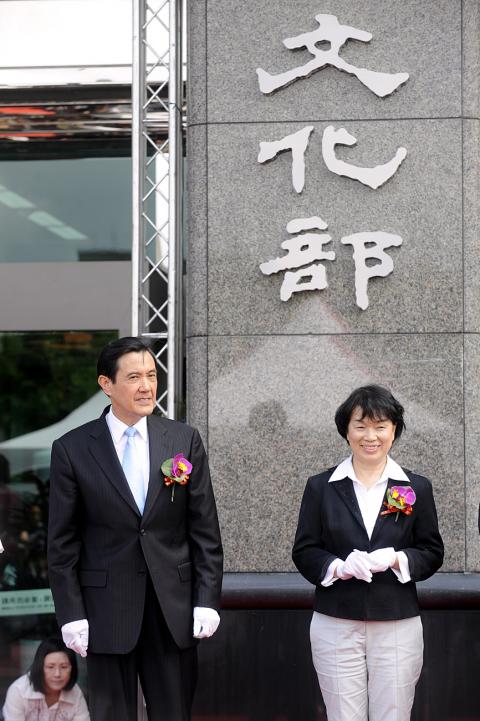Minister of Culture Lung Ying-tai (龍應台) yesterday said she hoped that cultural policies would be served by politics rather than serve political purposes.
Speaking at the inauguration of the new Ministry of Culture, which was attended by President Ma Ying-jeou (馬英九) and Premier Sean Chen (陳冲), Lung said she hoped that over the next four years, “culture will not serve politics, but will be served by politics.”
Lung expressed hope that cultural officials could be independent, knowledgeable, have an international perspective and a will of their own.

Photo: Sean Chao, Taipei Times)
“Ruling parties can come and go,” Lung said, but if cultural officials are independent-minded, they could withstand political influence and carry out cultural work to the benefit of the country.
Lung said if culture can permeate the central government’s policymaking decisions and play important roles in Taiwan’s education, foreign relations, economic and industrial policies, “then Taiwan will really be able to bring into full play its cultural advantages.”
She compared the establishment of the new ministry, which she described as “the project of the century,” to a relay race, saying that it is the cultural sector’s many years of efforts that have made the ministry possible.
In response, Ma said in a speech that if politics is a “fence,” then culture is “the pair of wings that fly over the fence.”
“Construction work can make a city larger, but only culture can make a city great,” Ma said.
He echoed Lung’s remarks about political interference in cultural affairs, saying that while culture agencies have served political purposes in the past, he would try to turn that around.
He said he hoped to provide more resources for the ministry in the future and that he expected the establishment of the ministry would spread “Chinese culture with Taiwanese characteristics” around Taiwan and the world.
The ministry was upgraded from the Council for Cultural Affairs after a Cabinet reorganization took effect on Sunday, and took over some responsibilities from the Ministry of Education, the now-defunct Government Information Office (GIO) and the Research, Development and Evaluation Commission.
George Hsu (許秋煌), a former deputy minister of the GIO, assumed office as the administrative deputy culture minister, while Chang Yun-cheng (張雲程) and Lin Chin-tien (林金田) were appointed political deputy ministers.
The ministry’s seven departments and two bureaus are tasked with general policy planning, fostering international cultural exchanges, development of the arts, the publishing industry, the cultural and creative industry, cultural resources and film, television and popular music, as well as protecting the country’s cultural assets.
Several people from the arts and culture sector attended the ceremony, including poet Chou Meng-tieh (周夢蝶), director Li Hsing (李行) and singer Lo Ta-yu (羅大佑).

Taiwan is stepping up plans to create self-sufficient supply chains for combat drones and increase foreign orders from the US to counter China’s numerical superiority, a defense official said on Saturday. Commenting on condition of anonymity, the official said the nation’s armed forces are in agreement with US Admiral Samuel Paparo’s assessment that Taiwan’s military must be prepared to turn the nation’s waters into a “hellscape” for the Chinese People’s Liberation Army (PLA). Paparo, the commander of the US Indo-Pacific Command, reiterated the concept during a Congressional hearing in Washington on Wednesday. He first coined the term in a security conference last

Prosecutors today declined to say who was questioned regarding alleged forgery on petitions to recall Democratic Progressive Party (DPP) legislators, after Chinese-language media earlier reported that members of the Chinese Nationalist Party (KMT) Youth League were brought in for questioning. The Ministry of Justice Investigation Bureau confirmed that two people had been questioned, but did not disclose any further information about the ongoing investigation. KMT Youth League members Lee Hsiao-liang (李孝亮) and Liu Szu-yin (劉思吟) — who are leading the effort to recall DPP caucus chief executive Rosalia Wu (吳思瑤) and Legislator Wu Pei-yi (吳沛憶) — both posted on Facebook saying: “I

The Ministry of Economic Affairs has fined Taobao NT$1.2 million (US$36,912) for advertisements that exceed its approved business scope, requiring the Chinese e-commerce platform to make corrections in the first half of this year or its license may be revoked. Lawmakers have called for stricter enforcement of Chinese e-commerce platforms and measures to prevent China from laundering its goods through Taiwan in response to US President Donald Trump’s heavy tariffs on China. The Legislative Yuan’s Finance Committee met today to discuss policies to prevent China from dumping goods in Taiwan, inviting government agencies to report. Democratic Progressive Party Legislator Kuo Kuo-wen (郭國文) said

The Ministry of Economic Affairs has fined Taobao NT$1.2 million (US$36,900) for advertisements that exceeded its approved business scope and ordered the Chinese e-commerce platform to make corrections in the first half of this year or its license would be revoked. Lawmakers have called for stricter supervision of Chinese e-commerce platforms and more stringent measures to prevent China from laundering its goods through Taiwan as US President Donald Trump’s administration cracks down on origin laundering. The legislature’s Finance Committee yesterday met to discuss policies to prevent China from dumping goods in Taiwan, inviting government agencies to report on the matter. Democratic Progressive Party